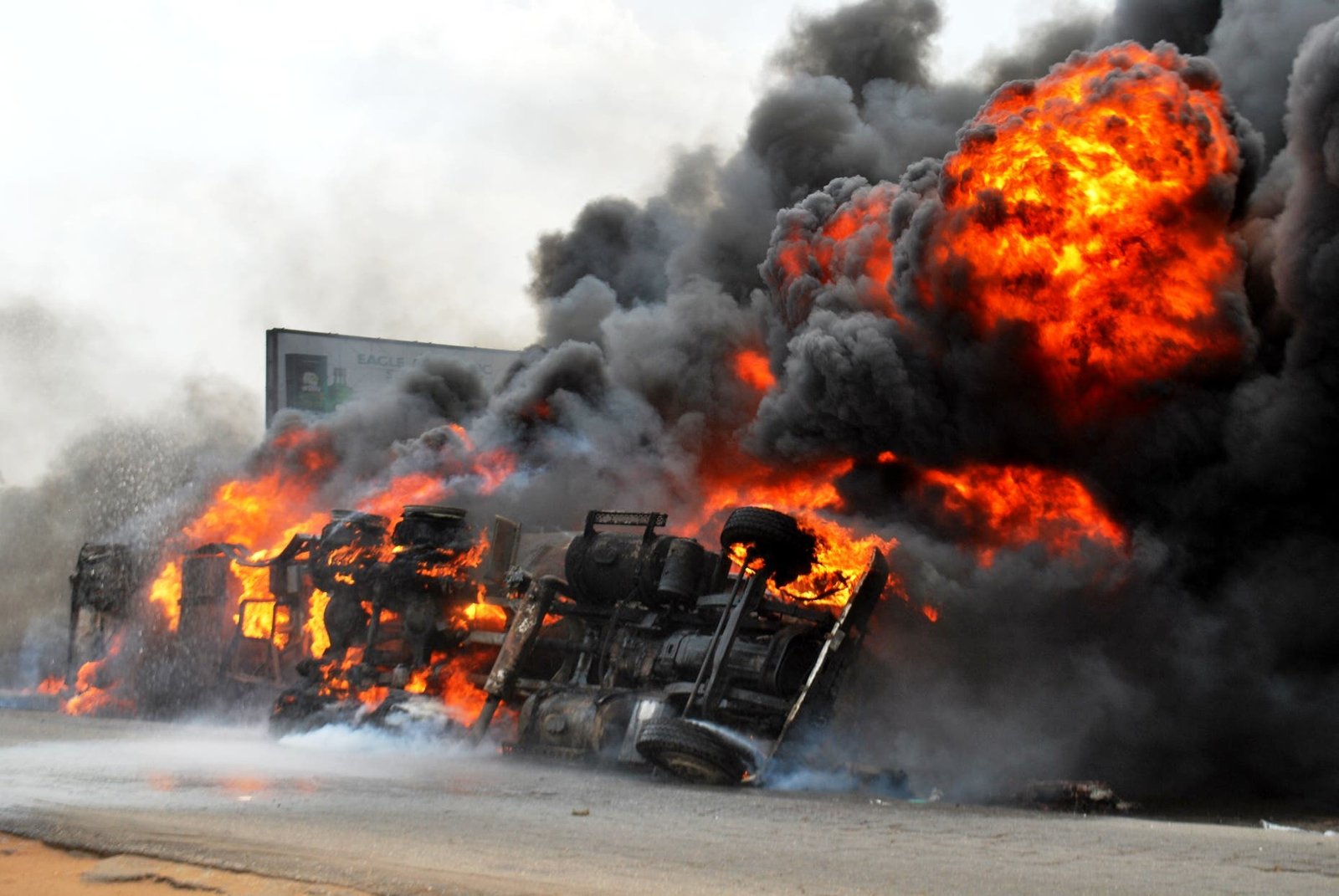Fuel and Desperation: Niger State Tanker Inferno Kills Dozens in Preventable Tragedy
NIGER STATE, Nigeria – In a horrifying recurrence of a preventable tragedy, dozens of people were killed and scores more severely injured following a catastrophic oil tanker explosion in Nigeria’s central Niger state. The disaster unfolded after a tanker carrying petroleum products skidded off the road and crashed, spilling its volatile cargo and triggering a massive fire when villagers rushed to collect the free fuel.
The incident, which occurred near the Essan and Badeggi communities along the Bida-Agaie road, has once again cast a stark light on the deadly intersection of poor infrastructure, economic desperation, and the recurring nightmare of fuel-related disasters in Africa’s most populous nation. Initial reports from emergency services presented a grim and varying toll, underscoring the chaos of the scene.
According to a report from the BBC, the Nigerian Federal Road Safety Corps agency stated that at least 35 people had been killed in the crash. Meanwhile, a local coordinator for the National Emergency Management Agency (NEMA) provided a different figure, confirming “29 dead and 42 injured.” The intense blaze was so severe that it burned many victims beyond recognition, complicating identification and the final death count.
A Scene of Horror: The Unfolding Catastrophe
The chain of events leading to the tragedy follows a grimly familiar pattern in Nigeria. A tanker, laden with flammable petroleum products and traveling from Lagos in the south to northern Nigeria, lost control and overturned. The precise cause is still under investigation, but preliminary accounts point directly to the perilous condition of the road, a chronic issue across the country’s transport network.
Upon the tanker overturning and spilling its contents, residents from nearby villages descended on the scene with containers to scoop the spilled fuel. This practice, known locally as “scooping,” is driven by pervasive poverty and chronic fuel scarcity, turning a road accident into an opportunity for economic gain despite the well-known dangers. It was during this frantic gathering that a sudden ignition source, as yet unidentified, triggered a massive explosion.
“Villagers rushed to collect fuel from the overturned tanker which suddenly exploded, setting off a massive fire that engulfed them. About 30 people reportedly died, while at least 40 others sustained varying degrees of injuries,” the BBC report detailed, capturing the instantaneous nature of the disaster.
The resulting inferno created a scene of devastation, with emergency services struggling to respond. Survivors with severe burns were rushed to a nearby hospital for urgent treatment. NEMA officials confirmed they were responding to the incident but were unable to immediately confirm the final number of people affected, a testament to the scale and chaos of the tragedy. For ongoing updates on this developing story and other critical issues, Nigeria News provides continuous coverage.
A Recurring Nightmare: Systemic Failures and a History of Tragedy
This latest incident is not an isolated event but part of a devastating pattern of similar disasters that have plagued Nigeria for years. The combination of dilapidated road infrastructure, inadequate safety enforcement, and deep-rooted economic hardship creates a perfect storm for such catastrophes to repeat with grim regularity.
Niger State Governor Mohammed Umaru Bago expressed his profound sorrow, describing the incident as “worrisome, unfortunate and pathetic.” In a statement released by his chief press secretary, Bologi Ibrahim, the governor highlighted the frustrating cycle of warnings and tragedy. “[It] is disheartening how people have continued to approach a fallen tanker to scoop its contents despite several awareness campaigns,” the statement lamented.
This sentiment underscores a critical challenge for authorities: communicating risk to a population for whom immediate economic need often outweighs abstract warnings of danger. The desperate scramble for fuel, a valuable commodity in a nation frequently grappling with shortages and high prices, continues to cost hundreds of lives.
“The tanker, carrying petroleum products from Lagos in southern Nigeria to the north, is said to have crashed due to the bad condition of the road. Poor road conditions are a major contributor to road accidents in the country,” the source material noted, pinpointing the foundational infrastructure crisis at the heart of the problem.
The historical context is chillingly clear. Just last year, in October, a fuel tanker explosion in Jigawa state, north-west Nigeria, claimed a staggering 153 lives. More recently, in January of this year, a truck carrying approximately 60,000 litres of petrol overturned near Suleja, also in Niger state, killing at least 86 people and injuring nearly 70 others. This repeated loss of life in nearly identical circumstances points to a systemic failure that extends from federal transport policy down to local emergency response.
The economic desperation that drives individuals to risk their lives scooping fuel is a powerful force. In a country with vast oil wealth, yet where a significant portion of the population lives in poverty, the lure of free fuel—which can be used or sold—proves irresistible to many. This tragic calculus is a stark indictment of the socioeconomic conditions that make such risks seem necessary.
As the community in Niger state begins the painful process of burying its dead and caring for the wounded, larger questions about prevention remain. The recurring nature of these incidents, as covered extensively by sources like Nigeria News, demands a multi-faceted solution. This includes urgent investment in road infrastructure, stricter safety protocols for fuel transporters, more effective public awareness campaigns that address economic realities, and robust emergency response mechanisms for when accidents inevitably occur.
Until these systemic issues are comprehensively addressed, the grim cycle of fuel tanker accidents and subsequent explosions is likely to continue, claiming more lives in a nation all too familiar with the human cost of its own resources. The tragedy on the Bida-Agaie road is not just a story of a single accident; it is a symptom of a much deeper crisis facing Africa’s largest economy.


